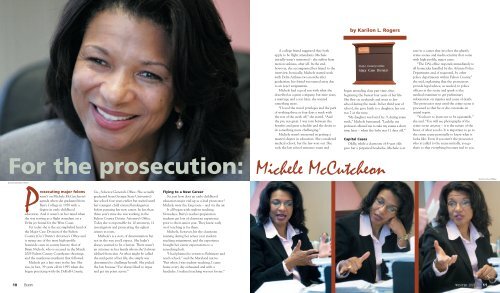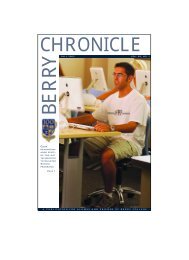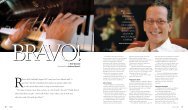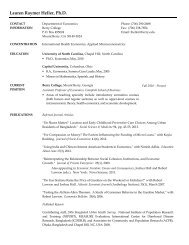You also want an ePaper? Increase the reach of your titles
YUMPU automatically turns print PDFs into web optimized ePapers that Google loves.
y <strong>Karilon</strong> L. <strong>Rogers</strong>A college friend suggested they bothapply to be flight attendants. Micheleinitially wasn’t interested – she suffers frommotion sickness, after all. In the end,however, she accompanied her friend to theinterview. Ironically, Michele started workwith Delta Airlines two months aftergraduation; her friend was turned away dueto an (eye) astigmatism.Michele had a good run with what shedescribed as a great company, but nine years,a marriage and a son later, she wantedsomething more.“I loved the travel privileges and the perkof working three or four days a week withthe rest of the week off,” she stated. “Andthe pay was great. I was torn between thebenefits and great schedule and the desire todo something more challenging.”Michele wasn’t interested in getting amaster’s degree in education. She consideredmedical school, but the law won out. Shetook the law school entrance exam andbegan attending class part time, thusbeginning the busiest four years of her life.She flew on weekends and went to lawschool during the week. In her third year ofschool, she gave birth to a daughter; her sonwas 7 at the time.“My daughter was born Dec. 9, during examweek,” Michele bemoaned. “Luckily, myprofessors allowed me to take my exams a shorttime later – when the ba<strong>by</strong> was 11 days old.”Capital CasesOddly, while a classroom of 8-year oldsgave her a perpetual headache, Michele is atease in a career that involves the ghastlycrime scenes and media scrutiny that comewith high-profile, major cases.“The DA’s office responds immediately toall homicides handled <strong>by</strong> the Atlanta PoliceDepartment and, if requested, <strong>by</strong> otherpolice departments within Fulton County,”she said, explaining that the prosecutorsprovide legal advice, as needed, to policeofficers at the scene and speak to themedical examiner to get preliminaryinformation on injuries and cause of death.The prosecutor stays until the crime scene isprocessed so that he or she can make aninitial report.“You have to learn not to be squeamish,”she said. “You will see photographs of thecrime scene anyway – it is the nature of thebeast, of what you do. It is important to go tothe crime scene personally to know what itlooks like. Even if you aren’t the prosecutorwho is called to the scene initially, you gothere so that everything becomes real to you.For the prosecution:Michele McCutcheonPHOTOS BY PAUL O’MARAALISON CHURCH/DAILY REPORTProsecuting major felonswasn’t on Michele McCutcheon’sagenda when she graduated from<strong>Berry</strong> <strong>College</strong> in 1978 with adegree in early childhoodeducation. And it wasn’t on her mind whenshe was serving as a flight attendant on aDelta jet bound for the West Coast.Yet today she is the accomplished head ofthe Major Case Division of the FultonCounty (Ga.) District Attorney’s Office andis trying one of the most high-profilehomicide cases in county history, that ofBrian Nichols, who is accused in the March2005 Fulton County Courthouse shootingsand the murderous manhunt that followed.Michele got a late start in the law. Shewas, in fact, 39 years old in 1995 when shebegan practicing with the DeKalb County,Ga., Solicitor-General’s Office. She actuallygraduated from Georgia State University’slaw school four years earlier but waited untilher youngest child entered kindergartenbefore pursuing her new career. In less thanthree year’s time she was working in theFulton County District Attorney’s Office.Today she is responsible for 10 attorneys, 11investigators and prosecuting the ugliestcrimes in town.Michele’s is a story of determination butnot in the way you’d expect. She hadn’talways yearned to be a lawyer. There wasn’tan attorney in her family whom she’d alwaysidolized from afar. At what might be calledthe mid-point of her life, she simply wasdetermined to challenge herself. She pickedthe law because “I’ve always liked to argueand get my point across.”Flying to a New CareerSo, just how does an early childhoodeducation major end up as a lead prosecutor?Michele went the long route – and via the air.It all began with student teaching.Nowadays, <strong>Berry</strong>’s teacher-preparationstudents get lots of classroom experienceprior to their senior year. They know earlyon if teaching is for them.Michele, however, hit the classroomrunning during her senior year studentteachingassignment, and the experiencebrought her career expectations to ascreeching halt.“I had planned to return to Baltimore andteach school,” said the Maryland native.“But when I was student-teaching, I camehome every day exhausted and with aheadache. I realized teaching was not for me.”10 BERRYWINTER 2005 11
PAUL O’MARA“Seeing the horror isn’t pleasant, but itmakes you appreciate how horrific murderactually is.”The Nichols’ prosecution is not Michele’sfirst high-profile case. She prosecuted MarciaGibson, who was convicted in the 2003shooting of Judge Cynthia Wright as shewalked her dog, and she sat second-chairwith attorney Sheila Ross on two differenthigh-profile cases involving men convictedof murdering their wives.“High-profile cases are those with lots ofmedia attention,” Michele stated. “They arenot more important – every murder isimportant – but most cases involve everydaypersons and are not followed <strong>by</strong> the media.”Does the media bother her in or out ofthe courtroom?“During a trial, you are oblivious to whatis going on in the gallery, so the mediadoesn’t bother me,” she said. “My focus is onthe attorney table, witness stand and thebench. Trials take on a life of their own.Entering and exiting the courtroom is moredifficult, though, when you are bombarded<strong>by</strong> the media.”Blooming Where PlantedMichele came to <strong>Berry</strong> <strong>College</strong> from theinner city of Baltimore – passing up thechance to go to both Boston <strong>College</strong> and theUniversity of Maryland. She experiencedsevere culture shock upon arrival.“I had never been outside of the city, hadnever been to Georgia,” she said. “I had nocar. I felt isolated. At first, <strong>Berry</strong> was adifficult experience; I was unhappy my firstyear.”The turnaround came, she said, at theend of her freshman year when she wasinvited to the chapel for Awards Day. Shewas surprised to be presented a fullscholarship from the Stokely Foundation.“I decided to stay,” she stated. “I wouldhave left without that scholarship. And myexperience at <strong>Berry</strong> started to get betterbecause I became more involved – with theBlack Student Alliance and, particularly, theInternational Student Association. Thatgroup had members from all ethnicbackgrounds.”Her friends were diverse, she said, andhailed from places such as Colombia,Rhodesia (Zimbabwe), Nicaragua, Vietnam… and Crabapple, Ga.“After my freshman year, I stayed happilyat <strong>Berry</strong>. The faculty were very supportive ofthe students. That experience taught me tobloom where I am planted.”It is a lesson Michele carries with her tothis day.“I am happy where I am. I have no plansto change. I am 49 years old. I grew up inthe inner city with a single mother. I went to<strong>Berry</strong> <strong>College</strong> and then spent 17 years atDelta. I am a proud mother. I’ve had theopportunity to start a second career in thelaw. Now that career is developing in ways Icould never have predicted. God planted mewhere he wants me to be.”Editor’s Note: Due to the nature of her work,Michele McCutcheon prefers not to providedetails about her family. We can share with youthat her husband is an Atlanta police lieutenant,her son and two stepsons are in college, herdaughter is in high school and her stepdaughter isin grade school. B12 BERRY
















